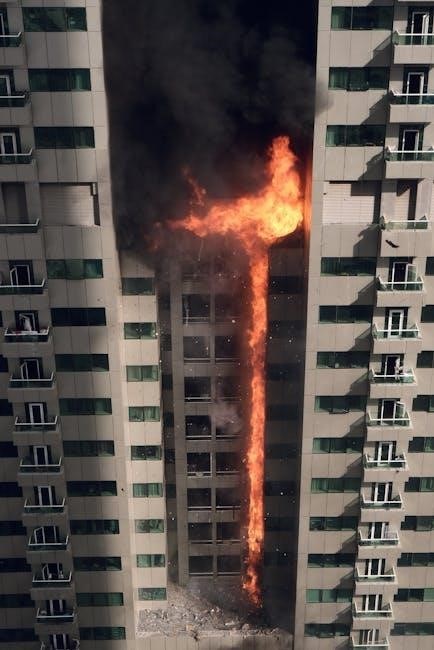The International Fire Code (IFC) is a model code published by the International Code Council (ICC), providing comprehensive fire safety regulations.
It establishes minimum requirements for fire prevention, protection systems, and public safety, adopted by jurisdictions worldwide to ensure consistency and protection.
1.1 Overview of the International Fire Code
The International Fire Code (IFC) is a model code published by the International Code Council (ICC), outlining fire safety regulations for buildings and structures. It provides minimum requirements for fire prevention, fire protection systems, and public safety. The IFC is widely adopted by jurisdictions to ensure consistency in safeguarding life, property, and the environment from fire hazards.
1.2 Importance of Fire Safety Codes
Fire safety codes are essential for preventing hazards, protecting property, and ensuring public safety. They provide standardized regulations for fire prevention, detection, and suppression systems. Compliance with these codes helps reduce risks, safeguards lives, and minimizes potential damages. They also ensure consistency in safety practices across jurisdictions, promoting a safer built environment for communities worldwide.

Accessing the International Fire Code PDF
The IFC PDF can be accessed through official ICC sources or free viewing options on their website. Subscriptions may be required for full access and downloads.
2.1 Official Sources for Download
The International Fire Code (IFC) PDF is available for download through the International Code Council (ICC) website, ensuring authenticity and compliance with copyright laws. Users can purchase the full PDF or access a free read-only version. Official sources guarantee the latest updates and accurate information, crucial for construction and fire safety professionals. Always verify sources to avoid unauthorized copies.
2.2 Free Viewing Options on ICC Website
The ICC website offers free viewing access to the International Fire Code through its Digital Codes platform. Users can view the code online without downloading, providing read-only access to the latest regulations. This option is ideal for professionals needing quick reference or updates, ensuring compliance with the most current fire safety standards without requiring a purchase.

Key Features of the International Fire Code
The IFC includes provisions for fire prevention and protection systems, utilizing prescriptive and performance-based approaches to ensure safety and adaptability in various building designs and materials.
3.1 Provisions for Fire Prevention and Protection
The International Fire Code outlines detailed provisions for fire prevention and protection systems, encompassing automatic sprinkler systems, fire alarms, emergency planning, and hazardous materials management. These regulations ensure structures are equipped to prevent fires, facilitate rapid response, and protect occupants and property effectively. Compliance with these provisions is crucial for maintaining public safety and reducing fire-related risks significantly.
3;2 Updates in the 2024 Edition
The 2024 IFC introduces significant updates, including new provisions for fire-resistant materials and advanced fire suppression systems. It also enhances requirements for emergency egress, fire alarm technologies, and storage of hazardous materials. These revisions aim to adapt to modern construction practices, improve safety standards, and address emerging fire risks. The updates reflect the ICC’s commitment to continuous improvement in fire safety regulations.
Complementary Codes and Standards
The International Fire Code works alongside the International Building Code (IBC) and NFPA standards, ensuring comprehensive fire safety and building regulations. Together, they enhance protection standards.
4.1 Relationship with International Building Code (IBC)
The International Fire Code (IFC) and International Building Code (IBC) are complementary, with the IFC focusing on fire safety and the IBC on building construction. Together, they ensure harmonized safety standards, addressing fire prevention, structural integrity, and emergency access. This integration is crucial for comprehensive public safety and property protection in jurisdictions worldwide.
4.2 NFPA Standards and Their Role
NFPA standards, developed by the National Fire Protection Association, provide detailed guidelines for fire safety systems, equipment, and practices. These standards complement the IFC by addressing specific fire protection measures, such as fire alarms, suppression systems, and hazardous materials handling. Together, NFPA standards and the IFC create a comprehensive framework for ensuring fire safety and protecting lives and property effectively.

Legal and Copyright Considerations
The International Fire Code is copyrighted by the ICC, limiting free downloads. Users must respect copyright laws when accessing or sharing the IFC PDF.
5.1 State and Local Adoptions
State and local governments adopt the International Fire Code (IFC) to enforce fire safety standards tailored to their specific needs. Each jurisdiction may amend the code to address regional risks and legal requirements, ensuring compliance with local laws and regulations.
The adoption process varies, with some states adopting the most recent edition while others use earlier versions with modifications, reflecting local priorities and safety goals.
5.2 Copyright Laws and PDF Downloads
The International Fire Code (IFC) is protected by copyright laws, with the International Code Council (ICC) holding ownership. Accessing the IFC PDF requires compliance with these laws, and unauthorized distribution or downloading is prohibited. The ICC offers digital access through its website, ensuring legal and secure usage.
Violating copyright laws can lead to legal consequences. Users are encouraged to obtain the IFC PDF through official channels, such as the ICC’s Digital Codes platform, to avoid piracy and ensure they receive the most accurate and updated version of the code.

Reliable Platforms for Fire Code Downloads
The ICC’s official website and Digital Codes platform provide secure, legal access to the International Fire Code PDF, ensuring compliance with copyright laws and up-to-date information.
6.1 ICC Website and Digital Codes Platform
The ICC website offers direct access to the International Fire Code PDF through its Digital Codes platform, providing free viewing options for basic access. Users can explore the code without downloading, ensuring compliance with copyright laws. The platform features a user-friendly interface, enabling easy navigation and search functionalities. It also supports cross-referencing with other codes, making it a reliable resource for fire safety professionals and regulators.
6.2 Open Library and Other Repositories
Open Library is a trusted platform offering free access to a vast collection of eBooks, including the International Fire Code PDF. It provides a convenient alternative to the ICC website for viewing and referencing fire safety regulations.
Other repositories like Archive.org also host older editions of the IFC, ensuring accessibility for research and compliance purposes. However, users must verify the authenticity and compliance of these sources with copyright laws before downloading or sharing.

Importance of Compliance with IFC
Compliance with the International Fire Code ensures life safety, property protection, and legal adherence, safeguarding communities from fire hazards and explosions through standardized regulations.
Non-compliance risks severe consequences, including penalties, increased liability, and heightened fire dangers, emphasizing the critical need for adherence to IFC standards and updates.
7.1 Safeguarding Life and Property
The International Fire Code (IFC) is designed to protect people and property from fire hazards through comprehensive safety regulations and standards.
It ensures buildings are constructed and maintained with fire prevention and suppression systems, reducing risks and potential damage.
Adherence to the IFC minimizes fire-related dangers, safeguarding lives and property while preventing costly losses and legal repercussions.
By establishing clear guidelines for fire alarms, sprinkler systems, and emergency planning, the IFC plays a critical role in maintaining community safety and resilience.
Its provisions are continually updated to address new risks and technologies, ensuring robust protection for both residential and commercial spaces.
7.2 Consequences of Non-Compliance
Non-compliance with the International Fire Code (IFC) can lead to severe legal penalties, fines, and even criminal charges.
It also increases the risk of fire-related incidents, endangering lives and property.
Insurance costs may rise, and businesses or property owners could face lawsuits due to negligence.
Non-compliance can result in building closures or operational shutdowns until violations are corrected.
Additionally, failure to adhere to the IFC jeopardizes public safety and may lead to loss of certification or licenses.
It is critical to comply with fire safety regulations to avoid these consequences and ensure community protection.
Recent Updates and Revisions
The 2024 IFC introduces significant updates, including a new formatting design and enhanced digital features, making it easier to identify and implement code changes effectively.
8.1 Changes in the 2024 Edition
The 2024 International Fire Code (IFC) features a revamped format, enhancing readability and usability. Key updates include new code language highlighted in blue, streamlined navigation, and digital enhancements. These changes aim to improve compliance and adaptation of modern fire safety practices, ensuring better protection of life and property. The updates reflect evolving safety standards and technologies;
8.2 Impact on Fire Safety Practices
The 2024 IFC updates enhance fire safety practices by improving emergency planning, fire department access, and hazardous materials management. New provisions promote advanced safety measures, ensuring better preparedness and response. These changes encourage the adoption of modern technologies and strategies, ultimately reducing fire risks and safeguarding communities more effectively than previous editions.

Training and Resources
The ICC offers training programs to help professionals understand and implement the IFC, covering essential updates and best practices for effective fire safety.
Additional resources, including online guides and workshops, support continuous learning and professional development in fire safety.
9.1 ICC Training Programs
The International Code Council (ICC) provides comprehensive training programs designed to educate professionals on the International Fire Code (IFC). These programs cover updates, interpretations, and practical applications, ensuring compliance with the latest fire safety standards. Participants gain in-depth knowledge through interactive sessions and expert-led discussions, enhancing their ability to implement the code effectively in real-world scenarios.
9.2 Online Courses and Workshops
Online courses and workshops provide flexible learning opportunities for professionals to master the International Fire Code (IFC). These resources, available on platforms like the ICC website, offer in-depth training on fire safety standards, updates, and compliance requirements. Many courses are free or low-cost, making them accessible to a wide audience.
Workshops often include interactive sessions, case studies, and expert Q&A, ensuring practical understanding of the IFC. These programs are essential for fire safety professionals, contractors, and building officials to stay updated on the latest code revisions and implementation best practices.
The International Fire Code (IFC) is essential for ensuring fire safety and protecting life and property. Compliance with its guidelines is crucial for public safety and legal adherence.
10.1 Summary of Key Points
The International Fire Code (IFC) is a critical document for fire safety, established by the International Code Council (ICC). It ensures life and property protection through comprehensive regulations. Compliance with the IFC is essential for legal and safety standards. Free access to the code is available on the ICC website, while paid options offer downloadable PDFs. Regular updates enhance safety practices, making the IFC indispensable for fire prevention and public safety.
10.2 Final Thoughts on IFC Compliance
Adhering to the International Fire Code is crucial for safeguarding life, property, and public safety. Compliance ensures legal adherence and prevents potential hazards. Utilizing free resources like the ICC website or Open Library provides accessible knowledge. Prioritizing IFC standards fosters a safer environment and avoids legal consequences of non-compliance.